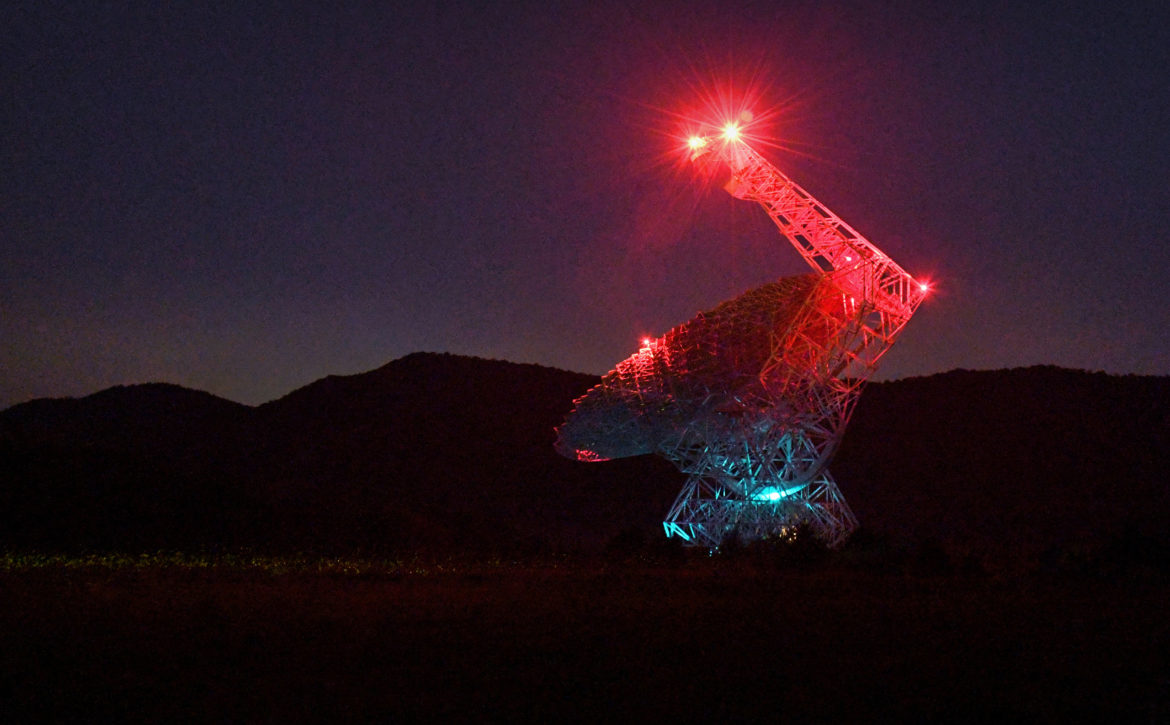
Hitting the Books: How a radio telescope cost this West Virginia town its modernity
Deep in the heart of Appalachia, modern science and America’s bucolic past meet at a unique crossroad of scientific discovery and luddite lifestyles. The Quiet Zone, by journalist Stephen Kurczy, is the story of a sleepy small town that hosts the Green Bank radio telescope. But the presence of this installation comes at a price: due to the telescope’s exceeding sensitivity, virtually every device and appliance that emits radio waves, Wi-Fi signals, or microwave radiation is banned for square miles around. That means that Green Bank, West Virginia has about as much tech today as it did in the 1950’s (maybe even a little less) — and some people very much like it that way. But not everybody. In the excerpt below, Pocahontas County attorney, Robert Martin, recounts the challenges of attempting to modernize the region without loosing a horde of gentrifiers upon it as well. Harper CollinsExcerpted from the book THE QUIET ZONE: Unraveling the Mystery of a Town Suspended in Silence by Stephen Kurczy. Copyright © 2021 by Stephen Kurczy. From Dey Street Books, an imprint of HarperCollins Publishers. Reprinted by permission.For every electrosensitive who wanted radio quiet, there were probably one hundred residents who wanted WiFi and cell service, and they elected the county’s officials. In early 2018, the Pocahontas County Commission passed a resolution in support of cell service throughout the county, a challenge to the very notion of a Quiet Zone. The commission assigned its attorney, Robert Martin, to contact all major telecommunications providers asking them to invest in Pocahontas.“I’m doing my level best to get another company in here,” Martin told me in the spring of 2018. He’d invited me to his house to discuss the new cell service ordinance, and we were swigging Bud Lights at his kitchen table.“How many cell companies have you written to?” I asked.“All of them,” he said. “I promised the companies that we’ll get everybody in the damn county to sign up with them. I’ll sign up first! . . . I wrote a letter to everybody and said, ‘We have shit for cellphone service here, we want you to come in here, we’ll partner with you, we’ll help you however we can. Come in here.’”At our feet were two boxers and a basset hound. In the adjacent mudroom was a 250-pound Vietnamese potbellied pig named Pig, who was snoring. Pig knew how to open the front door and pull a blanket over himself. “I’m the true image of West Virginia, aren’t I?” Martin laughed. “I got a pig living in the house.” Despite his home literally being a pigsty, Martin was always the best dressed at county meetings, usually wearing tight designer jeans, leather boots, and a crisp dress shirt, top buttons undone and a few chest hairs curling out. A blustery guy, Martin was once jailed in Marlinton for contempt of court for arguing with a circuit judge. He had a history of getting into fights at West Virginia University football games. For years, he’d also operated a hotel in Belize, paying “tens of thousands of dollars in bribes” and putting the payments on his tax returns so the U.S. government could see the corruption he was dealing with (even if he was admitting to violating the Foreign Corrupt Practices Act). Martin came across as a dogged lawyer who knew how to get things done. And he wanted cell service.“You seen that commercial saying Verizon has more coverage than anyone else?” he asked me. “Pause and look at it real closely, and you’ll see right where Pocahontas County is because almost the entire Eastern Seaboard is all yellow [signifying cell coverage] and right there in southeastern West Virginia there’s this hunk about this big—it’s Poca-fucking-hontas County. I swear to God. Right fucking there we are on Verizon’s commercials.”Martin knew well what connectivity was like outside the Quiet Zone. He had earned his law degree from West Virginia University in 1979, married a girl from Marlinton, and started his career in Pocahontas County before becoming a well-heeled insurance defense lawyer in Charleston. He’d gotten his first cellphone in 1986—it was the size of a beer bottle, with a three-foot-long antenna, and it went to bed with him every night. That attachment ended in 2012 when he moved back to Pocahontas, where he only carried an iPhone so he could listen to music in his truck. I asked if he was concerned about the impact of cell service on the electrosensitives.“Wackos that are afraid of their brains getting fried and all that?” he responded. “Yeah, I know about them.”“They see Green Bank as a haven,” I said.“So? So?” He said he wasn’t going to let the electrosensitives keep Pocahontas “behind the curve” for cell service.“But I’m here because you’re behind the curve,” I said. “That makes this place unique.”“You think we want to deal with stone knives and axes for the rest of our existence? You’re like these fucking people who move in here and don’t want it to change, that it? We have people who have moved here in the last five to ten years and they don’t want anything to change. They’ve ‘discovered’ Pocahontas County and now nothing can change. Well, fuck, that ain’t the way of the world. We have limitations because of the observatory, because of our topography, because of our insignificant population. But we need to do what we can as government entities to make things available to people.”“Of course,” Martin added, the cell service would have to comply with the Quiet Zone.“We believe in the observatory, we don’t want to fuck with them,” he said. “Right now, as you and I are sitting here bullshitting, they’re up there looking for fucking E.T. And I want to give them every opportunity to do that. But I’ve got emergency services I’ve got to render in this county.”In addition to trying to bring in cell service, Martin was assisting the county’s emergency services director, Michael O’Brien, to improve communications. The 911 center in Marlinton had difficulty broadcasting any emergency radio communications toward the northern end of the county, where Green Bank was located. O’Brien found a partial solution by installing an internet-controlled radio system just north of Green Bank in the town of Durbin, but it had minimal range and failed altogether when internet or electricity went down. Pocahontas was also one of the only counties in the state unable to adopt a “smart radio system” that integrated radios with smartphones.On the off chance that someone made an emergency 911 call from one of the county’s few pockets of limited cell service, authorities had an especially hard time pinpointing the person’s location. “We had a dispatcher spend two and a half hours on the phone one night with a lady that was trapped in her car in a creek,” O’Brien told me. “She didn’t know where she was or how she got there. We were just keeping her calm while we sent the department to look in all the areas that had cell service.”ACCORDING TO DELOIT TE, a 10 percent increase in mobile penetration increases total factor productivity—a key component of economic growth modeling—by 4.2 percentage points over the long run. In Pocahontas, businesspeople like Kenneth “Buster” Varner felt they needed all the help they could get to keep the county’s economy puttering along, which meant bringing in cell service.I first met Varner in early 2017, while eating breakfast at the counter at Station 2. A heavy, jowly man, he had leaned over and asked, “Do you think the gravy is too salty?” As we shoveled down heaping plates of biscuits and sausage gravy, he told me about his various businesses. Aside from owning Station 2, he operated a half dozen enterprises involved in logging, excavation, towing, septic pumping, and auto repair. He was also a fire chief. I told him that I imagined a lot of headaches trying to manage all those things within the restrictions of the Quiet Zone.“You have to realize that we never had cellphone service when everybody else had it, so it wasn’t anything to us,” Varner said. “It’d be more convenient, of course, if it was so you could use your cellphones all the time. But it’s a unique place to live where you don’t have them, and we take a little pride in that.” He noted how the observatory provided jobs and shared its resources, such as lending one of its diesel generators to a funeral home during a recent power outage. “That to me means a lot,” Varner said. “And having the largest telescope in the world out your back door, that’s a pretty neat conversation piece.”“People can get ahold of me the old-fashioned way,” he added. “Call me on the landline or come look for me.”Spending more time with Varner, however, I realized that he was hardly a Luddite. When we met again months later in his cluttered office, I found it hard to keep his attention. He kept glancing down at his iPhone to check texts and alerts he was receiving over WiFi. When he took a call, I was left to stare at a poster of a busty woman in a red bikini and firefighter helmet. When he finally put down the iPhone, I told him I was confused. Hadn’t he said he took pride in not using a cellphone?“I thought it was rude to have a smartphone,” Varner said of his “old” perspective, apparently from just a few months earlier. “I do a lot of business on that phone, more than I ever thought in my wildest dreams that I would do.” I asked if he could ever go back to living without one. “Wouldn’t want to. It’s so handy.”Varner had an AT&T data plan. He used Siri. He wished all his employees and volunteer firefighters could always be connected through smartphones. Instead, because of the Quiet Zone, he’d invested more than $30,000 in a specially approved radio repeater system to allow his workers to communicate via low-band radio. “I don’t want the observatory to close and for people to lose their jobs,” he said, “but it’d be more convenient for everybody.”
Read More


